A 每个字符最多出现两次的最长子字符串
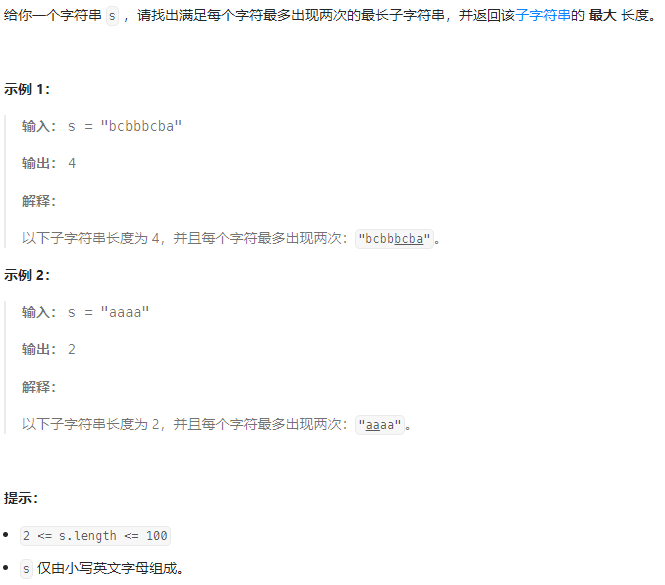
滑动窗口:枚举窗口的左边界,尽可能右移窗口的右边界。
(当然也可以暴力枚举)
class Solution {
public:int maximumLengthSubstring(string s) {vector<int> cnt(26);int res = 0;for (int l = 0, r = -1, n = s.size();; cnt[s[l++] - 'a']--) {while (r + 1 < n && cnt[s[r + 1] - 'a'] + 1 <= 2)cnt[s[++r] - 'a']++;res = max(res, r - l + 1);if (r == n - 1)break;}return res;}
};
B 执行操作使数据元素之和大于等于 K
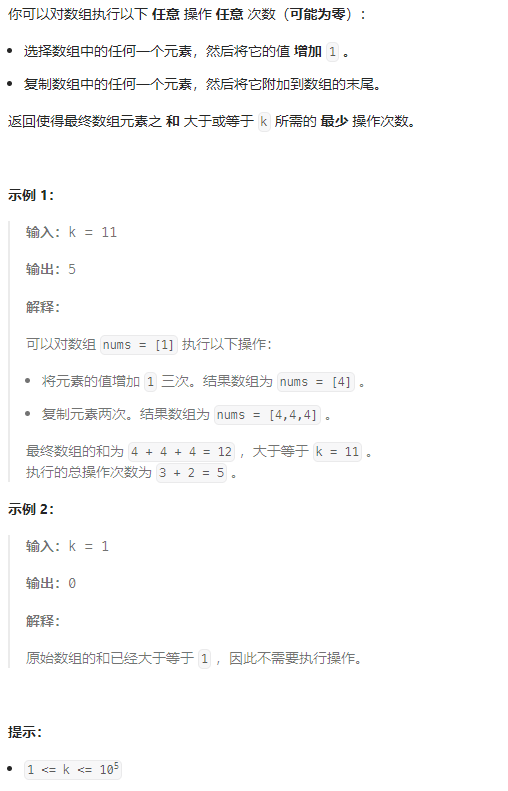
枚举:容易知道存在一种方案:“先通过第一种操作将数组从 [ 1 ] [1] [1] 变为 [ i ] [i] [i] ,再通过第二种操作让数组和不小于 k k k” 可以让操作数最少。枚举 i i i 以计算最小操作数
class Solution {
public:int minOperations(int k) {int res = INT32_MAX;for (int i = 1; i <= k; i++)res = min(res, i - 1 + (k - 1) / i);return res;}
};
C 最高频率的 ID
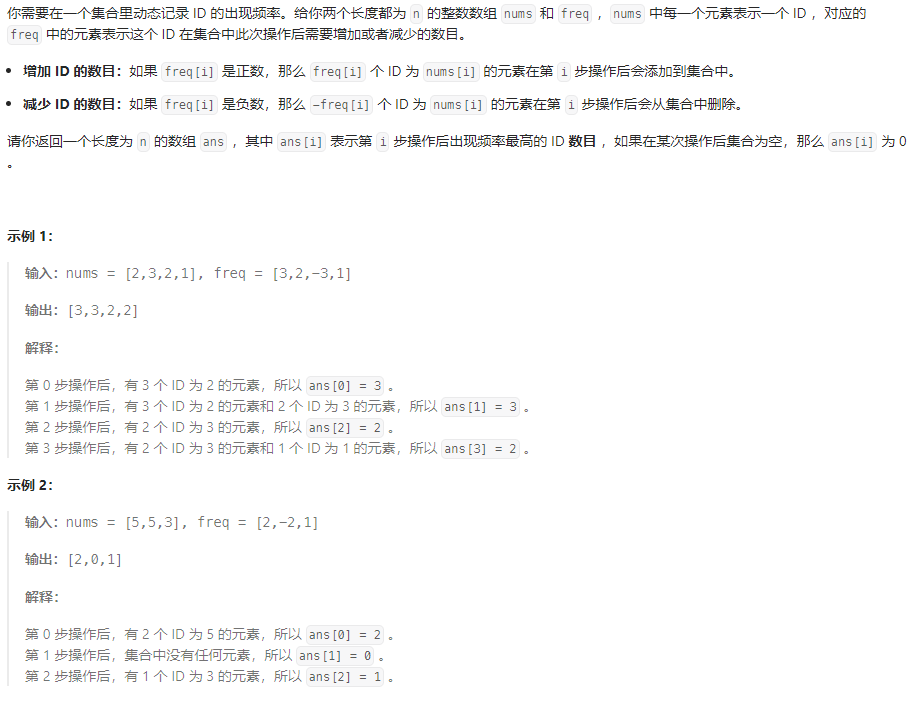

最大堆+哈希:用最大堆维护当前频率最高的ID,用哈希表记录各ID的最新频率
class Solution {
public:using ll = long long;vector<long long> mostFrequentIDs(vector<int> &nums, vector<int> &freq) {priority_queue<pair<ll, int>> heap;//(freq,id)unordered_map<int, ll> f;vector<ll> res;for (int i = 0; i < nums.size(); i++) {f[nums[i]] += freq[i];heap.emplace(f[nums[i]], nums[i]);while (f[heap.top().second] != heap.top().first)heap.pop();res.push_back(heap.top().first);}return res;}
};
D 最长公共后缀查询
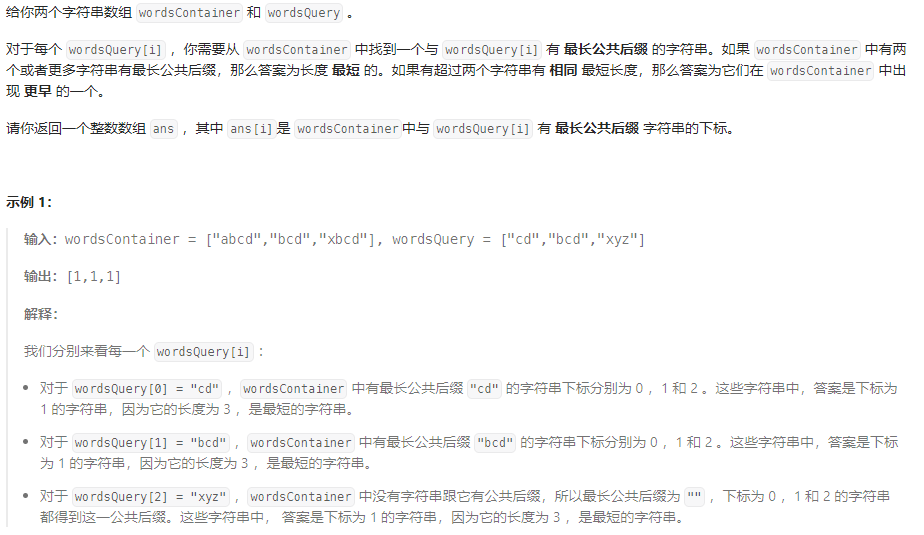
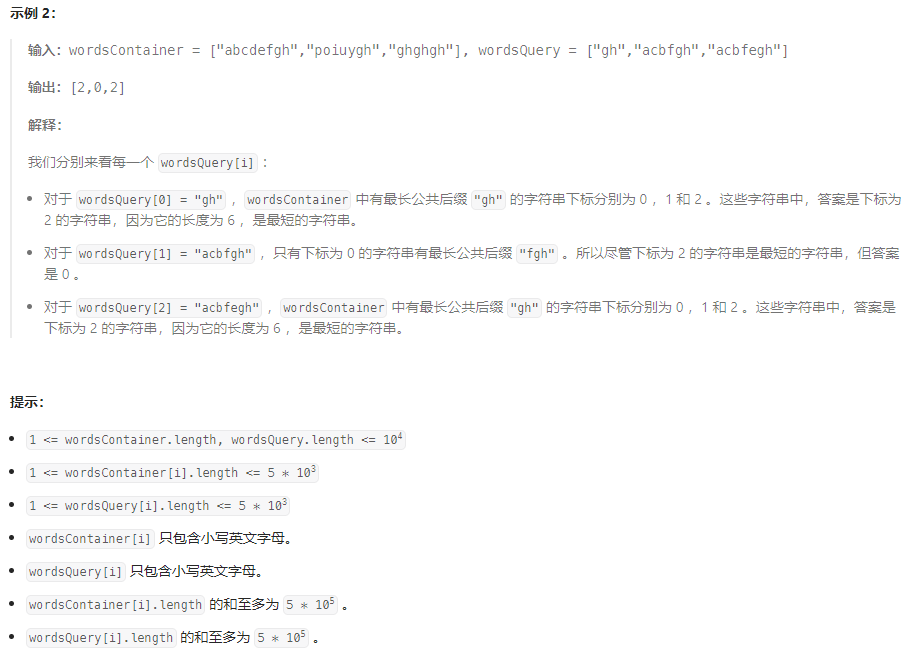
字典树:遍历 wordsContainer 中的字符串,并将其按后缀插入字典树,同时更新字典树插入路径上的标记。然后遍历 wordsQuery ,在字典树上查询匹配的最长后缀的标记
class Solution {
public:vector<int> stringIndices(vector<string> &wordsContainer, vector<string> &wordsQuery) {trie tree;for (int i = 0; i < wordsContainer.size(); i++)tree.insert(wordsContainer[i], i, wordsContainer[i].size());vector<int> res;for (auto &q: wordsQuery) res.push_back(tree.find(q));return res;}class trie {//字典树public:trie *next[26];int ind;//标记int mn;//wordsContainer[ind]的长度trie() {for (int i = 0; i < 26; i++)next[i] = nullptr;ind = -1;mn = 0;}void insert(string &s, int id, int len_i) {trie *cur = this;if (cur->ind == -1 || cur->mn > len_i) {//公共后缀为空的情况cur->ind = id;cur->mn = len_i;}for (auto i = s.rbegin(); i != s.rend(); i++) {if (!cur->next[*i - 'a'])cur->next[*i - 'a'] = new trie();cur = cur->next[*i - 'a'];if (cur->ind == -1 || cur->mn > len_i) {//更新标记cur->ind = id;cur->mn = len_i;}}}int find(string &s) {trie *cur = this;for (auto i = s.rbegin(); i != s.rend(); i++) {if (!cur->next[*i - 'a'])break;cur = cur->next[*i - 'a'];}return cur->ind;}};
};
)







![[iOS]GCD(一)](http://pic.xiahunao.cn/[iOS]GCD(一))


)




】二叉树的链式结构--前、中、后序遍历实现详解,节点数目计算及oj题目详解---二叉树学习日记③)


